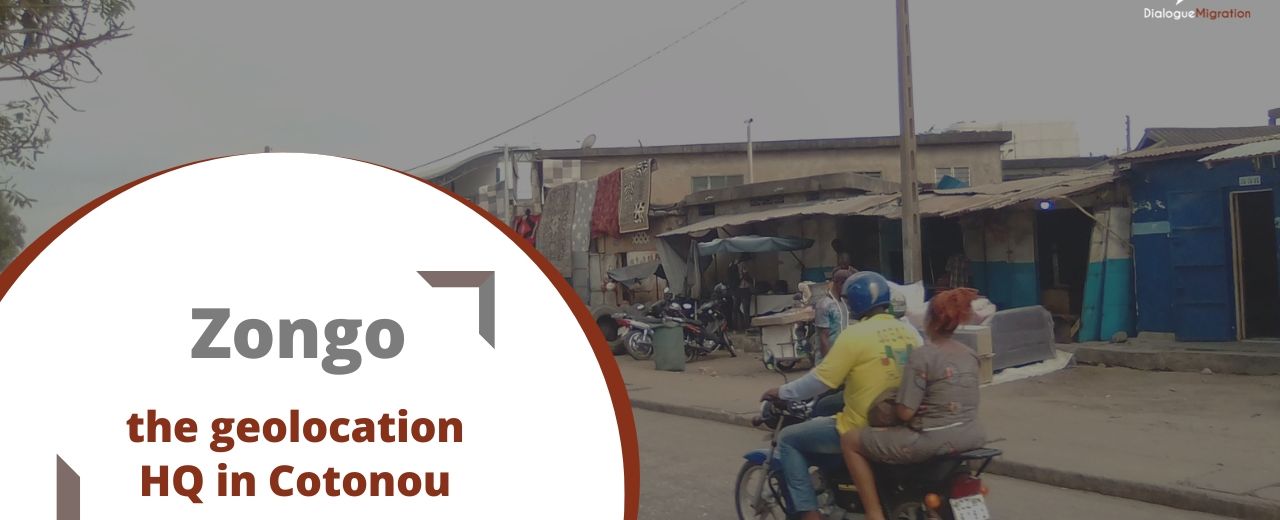

Located in downtown Cotonou, in Benin’s Littoral department, Zongo is one of the 15 neighborhoods of the fifth arrondissement. Its creation and its singularity, which stand the test of time, are the expression of a mix and a way of life between predominantly Hausa and indigenous merchant communities that have been perpetuated for several generations.
At the Zongo crossroads in Cotonou, there is an imposing mosque. The epicenter of Muslim activities in the city, it is called “Central Mosque of Zongo”. Etymologically, Zongo designates a place where one finds accommodation in transit, or temporarily to go about its activities, most often commercial, with a predominance of the Hausa, and the presence of a mosque. A Zongo is found in almost all major cities of Benin, and countries of the sub-region.
“The Zongo district is a neighborhood where all the nationals of Togo, Nigeria and Niger could go. It was a roundabout, where everyone came to meet. A bit like the Place de l’Étoile Rouge where, if someone wants to leave Lomé or Niger, we tell them that once they arrive at the Etoile, to call so that we come and pick them up. It’s the same as Zongo. It was a center, a crossroads where everyone came to gather,” explains Ayayi Franck d’Almeida, local elected representative of the neighborhood.
Known for its mosque, one of the largest in Cotonou, Zongo finds its originality in its hospitality, the dominant practice of Islam, and its commercial activities.
“When you land in Zongo from anywhere, you can’t get lost. In the neighborhood there are the Igbo, the Hausa, the people of Abomey, the North of the country, Nigeria, Togo, Niger and Burkina Faso; people from all over the place… It’s a big business center,” says the local elected official. These activities are mostly tenuous by non-indigenous communities.
In Cotonou, it is one of the oldest districts. Its existence, according to various sources, dates back to the colonial period. The origin of this neighborhood that attracts attention is very distant.
“I can’t say when the neighborhood was created, because it’s an old one in Cotonou, such as the Habitat, Guinkomey neighborhoods, etc.
They date from well before 1960, the year of independence,” says a neighborhood wise person.
Before, according to the local elected official, there was only one Zongo and it was mainly made up of Beninese. But over time, the neighborhood was split in two. “Towards the mosque, it is Zongo-Nima which means the Muslim quarter. It is inhabited by the Hausa and others; then, there is Zongo-Ehuzu, a neighborhood of the natives. However, as the years passed, people began by selling their land to buyers,” the local elected official observes.
From one generation to another
In Zongo, several generations have succeeded. Aged 25, Abdul Kadri testifies: “I was born here, my parents are all Nigeriens.” He is fluent in French and serves as an interpreter for the non-Hausa-speaking clientele of the second-hand computer shop run by one of his uncles. Between two discussions about his activities, he tells us about the advantages of their seniority in the area, “we do not pay the same as others because we have been here for a very long time,” he says.
Hamidou, in his thirties, who returned from Niger about three months ago, is in the transit of second-hand vehicles and lives in Zongo between two “missions” of transit of second-hand vehicles. He spent a good part of his life between Niger, Parakou and Zongo. From a Dendi father from Djougou in northwestern Benin, and a Nigerien mother, he feels at home everywhere.
Sunday is Igbo and runs a vehicle parts shop at Zongo Junction. Residing in Cotonou for a decade with his small family, from his travels between Nigeria and Benin where he keeps his business, it is the sense of business in this district and its peaceful climate that mark him. “There is no problem here. Everyone does their business…”. He perpetuates, like many of his compatriots, the presence of the Igbo in Cotonou in the sector of the sale of parts for vehicles, of which the district is a reference.
Special features of Zongo
One of the characteristics of the Zongo district in Cotonou is its solidarity. This seems to be perpetuated over time.
“Here, our parents have always been supportive. Before, during your childhood when you leave the house, you can be found in the house of a Hausa, a Muslim. And we know that when you’re not home you’re there. There is no ‘this one is not my child’. We have always been in solidarity and we still are,” maintains Ayayi Franck d’Almeida.
The particularity of Zongo lies, according to local residents, largely on its inhabitants who are mainly nationals of northern Benin, Niger and Burkina Faso.
In addition, “Zongo is a crossroads, it is a major business hub. In all the streets there are quite a few shops; It’s huge,” says Franck Ayayi d’Almeida.
Its position as a commercial crossroads and meeting place between different communities in different countries where people live together in symbiosis attracts the attention of many.
Previously considered a ghetto, especially on the side of the rails, today Zongo looks better thanks to the sanitation and urbanization programme in the communes of Greater Nokoué which has allowed the establishment of structures for collecting household waste, sweeping and paving streets, and advertising lighting using solar street lights.
Other economic activities are developing in addition to the traditional sheep and beef sales activities and “Tchatchanga” (meat skewers). There are furniture, children’s toys, household appliances, and other second-hand objects, mostly imported from the West.
Its mosque in the heart of Cotonou remains a religious epicenter where large assemblies are held and a compass that, despite the years, allows you to orient yourself.
Zongo has a population of 2771 inhabitants, according to data from the National Institute of Economic Analysis and Statistics from the 2013 General Population and Housing Census (RGPH4-2013). With 429 and 206 households respectively in Zongo-Ehuzu and Zongo-Nima, and a population of 1796 inhabitants for Zongo-Ehuzu against 975 for Zongo-Nima.
Thanks to its position, two large bus stations are located with buses that serve Niger, Burkina and Mali. A way to bring its inhabitants closer to their communities of origin located hundreds of kilometers away, in a reasonable time.


